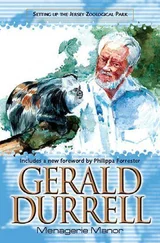Not long after Gerald’s thirteenth birthday in January 1938, his idyllic life on Corfu was given a severe jolt when his tutor and mentor Theo Stephanides decided to leave the island to take up an appointment with an anti-malarial unit founded by the Rockefeller Foundation in Cyprus. His departure was to mark the beginning of the end of the Durrell family’s utopian dream.
Leslie had begun to go native, drinking and brawling with the Greek peasant men whenever the opportunity offered. Larry and Nancy had kept themselves busy making improvements to their house in Kalami, but it was not enough. Holed up in the solitude of the north, the young couple had turned upon themselves, rowing vehemently and sometimes violently. It had not helped that in the summer of 1936 Nancy had become pregnant, and had had an abortion arranged by Theo, not something taken lightly in the moral climate of that place and time. Mother had been shocked to the core when she found out about it. The family edifice had begun to crack after that, and Lawrence had started to grow restless and bored in the narrow confines of paradise. When two young English dancers of his acquaintance came to stay, he slept between them on the beach at night, telling Nancy to find somewhere else to sleep. ‘He was going through a stage when he was tired of being an old married man,’ Nancy recalled with bitterness, ‘and so he tried to push me out of it, and snub me all the time, and was being rather beastly.’ Finally Lawrence had decided they should recharge their creative batteries in Paris and London, and leave the island for a while. Margo, now twenty, decided it was time she made her own way in the ‘real world’, and returned to England.
As for Gerald, such childish innocence as he may have brought to the island – not much, doubtless, but some – was blown away with the onset of puberty, when other interests began to conflict with his earlier enthusiasm for non-human forms of life. From time to time he would play ‘mothers and fathers’ with a young female counterpart – an activity that was seen as a natural part of the curiosity of a highly intelligent boy – and in middle age he was to confide to a friend: ‘Before you knew where you were, the knickers were off and you were away.’
Though the remaining Durrells seemed content to drift aimlessly into the future on their paradise island, the world beyond Corfu’s shores had other plans. War was looming in Europe. In the north, Hitler’s Germany was preparing to march. In the south, Mussolini was loudly braying Italy’s claims to dominion over Albania and to territorial rights over Greece, Corfu included.
Lawrence and Leslie had always sworn to help defend the island against the Italians, but they were overtaken by events. By April 1939 Mary Stephanides and her daughter Alexia had already left Corfu to live in England. Gerald was sorry to see the young girl go, for she had become his best and closest playmate. As war in Europe grew more inevitable by the day, Louisa began to think it might be unwise to linger. In My Family Gerald was to claim that it was her concern for his future education that prompted Mother to leave Corfu. By now he was fourteen years old, and was, as Mary Stephanides recalled, ‘quite independent of adult control. Lawrence tried to be a father to him at times, but he was seldom living in the same home, and was in any case too indulgent towards his small brother. And Gerald always got his own way with his mother. Only Theodore maintained any form of control over him, and that was only once a week. So even if war had not started in 1939, the Corfu days of Gerald Durrell were by then strictly numbered.’
It was Grindlays Bank, Mother’s financial advisers in London, who gave the final push, warning her that when war came her funds might be cut off, and she would be stranded in Greece for the duration without any means of support. In June 1939, therefore, she left the island with Gerald, Leslie and the thirty-year-old Corfiot family maid, Maria Condos.
‘As the ship drew across the sea and Corfu sank shimmering into the pearly heat haze on the horizon,’ Gerald was to write of that decisive farewell, ‘a black depression settled on us, which lasted all the way back to England.’ From Brindisi the train bore the party – consisting of four humans, three dogs, two toads, two tortoises, six canaries, four goldfinches, two greenfinches, a linnet, two magpies, a seagull, a pigeon and an owl – northward to Switzerland.
At the Swiss frontier our passports were examined by a disgracefully efficient official. He handed them back to Mother, together with a small slip of paper, bowed unsmilingly, and left us to our gloom. Some moments later Mother glanced at the form the official had filled in, and as she read it, she stiffened.
‘Just look what he’s put,’ she exclaimed indignantly, ‘impertinent man.’
On the little card, in the column headed Description of Passengers had been written, in neat capitals: ONE TRAVELLING CIRCUS AND STAFF.
Now only Lawrence and Nancy were left – or so it seemed – clinging on in the White House on the edge of Kalami bay as the late summer sun burned down on them and the Germans marched into Czechoslovakia and the Italians occupied Albania, only a few miles across the water. But there was one last twist in the family’s Corfu saga, for one day Margo suddenly reappeared, having decided that the island was where her true home and friends were. She holed up in a peasant hut with a tin roof on the Condos family patch at Pérama, sleeping in the same big old wooden bed as her peasant friends Katerina and Renee, washing in a little basin outside the door, and hoping that she could sit out the war on her beloved island disguised as a peasant girl herself.
Lawrence and Nancy lingered a little longer, in some trepidation as to what the future would bring. The confusion of impending war had lapped as far as the north of Corfu now, and it was time to decide whether to go or to be marooned on the island. Margo received a secret note from Spiro, still loyally guarding the family’s interests: ‘Dear Missy Margo, This is to tell you that war has been declared. Don’t tell a soul.’ Lawrence recalled the day war was declared with anguish. ‘Standing on the balcony over the sea,’ he wrote to his friend Anne Ridler in October, ‘it seemed like the end of the world … It was the most mournful period of my life those dark masses murmuring by the lapping water like the Jews in Babylon; such passionate farewells, so many tears, so much language …’
Every able-bodied man and every horse had been mobilised. Corfu town was swarming with people looking for a way to escape, and huge naphtha flares burned on the boats that were unloading bullets and flour at the docks. In Kalami children were weeping in the garden, and Cretan infantry were marching about, ‘smelling like hell, but with great morale’. The local commander was planning to rig up torpedo tubes outside the White House and to mine the straits. Then all the men of the village were sent inland to a secret arms dump, including Anastassiou, ‘our suave, cool, beautiful landlord, too feminine and hysterical to handle a gun’. Only the women were left, weeping around the wells, and the uncomprehending children. ‘I had nothing to say goodbye to except the island,’ Lawrence wrote. ‘I ached for them all.’
Frantically Lawrence and Nancy prepared to leave, destroying papers and drawings, packing the few books they could carry. The little black and brown Van Norden would have to be left behind, and Nancy’s paintings – ‘lazy pleasant paintings of our peasant friends’ that hung on every wall. In weird, autumnal weather, clouds piled high over Albania, the narrow straits like a black sheet, the thin rain falling ‘like Stardust’, they boarded a smoky little Athens-bound steamer at Corfu quay and fled the island. ‘I remembered it all,’ he was to write, ‘with a regret so deep that it did not stir the emotions … We never ever speak of it any more, having escaped.’
Читать дальше










